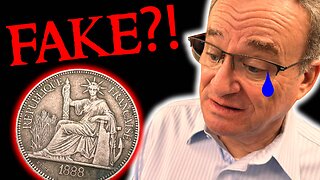Premium Only Content

John C Calhoun Tells His Story of Entering Politics During the War of 1812, Before Becoming VP 2X
Presented to you by: http://www.HistoricalConquest.com
Read more on our blog at: https://www.historicalconquest.com/blog
My name is John C. Calhoun, and I was born on March 18, 1782, in Abbeville, South Carolina. I came into the world just as the United States was finding its independence, and I would spend my life shaping, debating, and sometimes dividing this nation. I grew up on a frontier farm, working hard and learning the value of perseverance. Education was my path forward, and after attending Yale University and studying law, I entered politics to serve both my state and this growing republic.
I started my political career in Congress during the War of 1812. I was a strong supporter of that war because I believed in protecting American honor and securing our future as a powerful nation. As I rose in politics, I served as Secretary of War under President James Monroe, where I worked to modernize and strengthen the military. But my ambitions didn’t stop there. I became Vice President of the United States, serving under both John Quincy Adams and Andrew Jackson — a rare and unusual feat. It was during these years that my ideas began to solidify, especially my defense of states’ rights.
I believed deeply in the concept of limited federal power and the rights of individual states to govern themselves. To me, the Union was a partnership, not a system where the federal government could impose its will. This belief came to a head during the Nullification Crisis of the 1830s. South Carolina, my beloved home state, opposed federal tariffs that hurt our economy. I argued that states had the right to “nullify,” or reject, federal laws they deemed unconstitutional. It was a fierce debate with President Jackson, who saw nullification as a threat to the Union itself. Though the crisis was resolved without war, it was clear to me that tensions between North and South were growing.
My most controversial position was my defense of slavery. I viewed it as essential to the Southern economy and way of life, and I argued — wrongly, as history has shown — that it was a “positive good.” I know this belief casts a shadow over my legacy, and it’s important to acknowledge that the institution of slavery caused unimaginable pain and division in our nation. Yet, I saw my role as protecting the rights of Southern states, and this brought me into constant conflict with abolitionists in the North.
Throughout my career, I served as a U.S. senator, Secretary of State, and political theorist. I fought for what I believed, sometimes fiercely and stubbornly. I warned of the growing divide between the North and South, and I knew that compromise would not last forever. Though I did not live to see it, the Civil War loomed on the horizon, driven by the same debates I had spent my life defending.
I died on March 31, 1850, in Washington, D.C., leaving behind a legacy that sparks debate to this day. I hope you, as students of history, will reflect on the complexity of the people who shaped this nation. I fought for my beliefs, but history also teaches us to confront the consequences of those beliefs. My life was one of passion, power, and conflict — a story woven into the fabric of America’s past.
Visit us at: https://www.historicalconquest.com/marketplace
#historicalconquest #history #historical #RevolutionaryWar #AmericanRevolution #AfricanAmerican #BlackAmerican #Freedom #Slavery #Liberty #Independence #Justice #Freedom #colonialera #colonialamerica #constitution #usconstitution #unitedstates #unitedstatesofamerica
-
 0:59
0:59
The Historical Conquest Channel
7 days agoNY Bishop John Hughes Tells His Story of Becoming a Catholic Bishop and Fighting for immigrants
151 -
 56:45
56:45
VSiNLive
6 hours ago $5.09 earnedFollow the Money with Mitch Moss & Pauly Howard | Hour 1
68.1K2 -
 52:44
52:44
Candace Show Podcast
7 hours agoMy Conversation with Only Fans Model Lilly Phillips | Candace Ep 122
86K270 -
 LIVE
LIVE
tacetmort3m
7 hours ago🔴 LIVE - RELIC HUNTING CONTINUES - INDIANA JONES AND THE GREAT CIRCLE - PART 5
196 watching -
 26:52
26:52
Silver Dragons
6 hours agoCoin Appraisal GONE WRONG - Can I Finally Fool the Coin Experts?
32.6K2 -
 UPCOMING
UPCOMING
Bare Knuckle Fighting Championship
12 hours agoBKFC on DAZN HOLLYWOOD WARREN vs RICHMAN WEIGH IN
23.5K -
 6:49:16
6:49:16
StoneMountain64
10 hours agoNew PISTOL meta is here?
34.9K1 -
 20:58
20:58
Goose Pimples
11 hours ago7 Ghost Videos SO SCARY You’ll Want a Priest on Speed Dial
19.8K3 -
 2:24:59
2:24:59
The Nerd Realm
9 hours ago $2.80 earnedHollow Knight Voidheart Edition #09 | Nerd Realm Playthrough
36.2K2 -
 1:21:14
1:21:14
Awaken With JP
11 hours agoDrones are for Dummies - LIES Ep 70
119K58